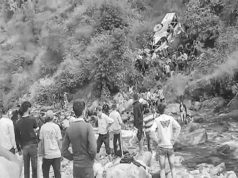 By Anil Raturi
By Anil Raturi
Recently, I came across a graphic on social media that exhibited a projection of the probable growth of followers of a particular religion in the European countries by 2050. It provoked the question, are religion, culture, and politics intertwined?
Historically, culture has variously affected the quality of life in human societies.
Culture is shaped by a large number of factors.
One of the most important factors affecting culture is religion.
In independent India, its goal of rapid socio-economic development has significantly been impacted by long-standing regressive cultural factors, which directly or indirectly emanate from its various religions. Even though nature has endowed India with a bounty of natural wealth, substantial number of its people still continue to confront poverty.
Its caste and community strife is a formidable challenge for any serious administration that genuinely wants to improve the quality of life of its people. This endemic social strife and its divisive nature have impacted the land’s history by repeated conquests and subjugation, resulting in colonial economic exploitation and further impoverishment.
In a complex manner, religion shapes culture and society. No matter what the clergy of various religions may say, religion was not created by God. It is Man who created religion! Religion is an artificial social construct, distinct from nature (prakriti). The daily rising and setting of the Sun is “prakriti”. Religion is human social construct and hence artificial, “sanskriti”.
Before 1500 AD, all the countries of the world were predominantly agricultural societies.
Then onwards Europe witnessed a rapid growth of scientific knowledge leading to industrialisation. Due to various social factors, Christian Europe created an atmosphere that facilitated scientific research and inventions. Individuals were able to transcend the dragnet of religious persecution to be able to think relatively freely. Inventions such as railway, electricity, telephone, automobile, aeroplane, etc., that are so common around the world today are products of just the last two centuries, a result of relative human emancipation from the constraints of traditional religion in Europe.
In the last five hundred years, due to the growth of science and technology, ultimately, Christian nations of Europe (and later America) emerged as the most powerful societies of the world.
In comparison, due to relegated scientific development as a consequence of cultural factors (particularly 19th century onwards), the Turko-Arab-Persian (Islamic) countries, the (Hindu-Muslim-Buddhist) South Asia/South East Asians became conquered societies or remained so called developing/underdeveloped nations. Communist China unsubscribed religion and, through a chequered course, ultimately, in the last few decades, miraculousy lifted millions of people out of poverty.
Certainly, no society is perfect.
However, the religious ethos (culture) of a society does seem to impact the socio-economic development of countries for better or worse.
In varying degrees, it also affects social attitudes such as patriarchy, equality of women, and individual’s freedom of expression, beliefs, etc.
In the 21st century, the worst tragedy that can befall an individual is religious persecution which results in execution!
Particularly if the anointed system legally defines it (based on religious tenets) as divinely prescribed justice!
The system of a country is established and run by a political dispensation. Which in turn emerges through the dynamics of political power. In a sense, political power is the engine that impels a society towards a better or worse path.
Demographics and religious-cultural beliefs impact political power as they shape the kind of dispensation that ultimately emerges to rule a society.
In this context, it would be interesting to observe, how the projected demographic change, should it become a fact, would affect Europe’s values and culture (which were primarily evolved in a Christian–more Protestant than Catholic-ethos) and thereby shape the developed continent’s future?
(Anil Raturi is a retired IPS officer and former DGP, Uttarakhand.)







